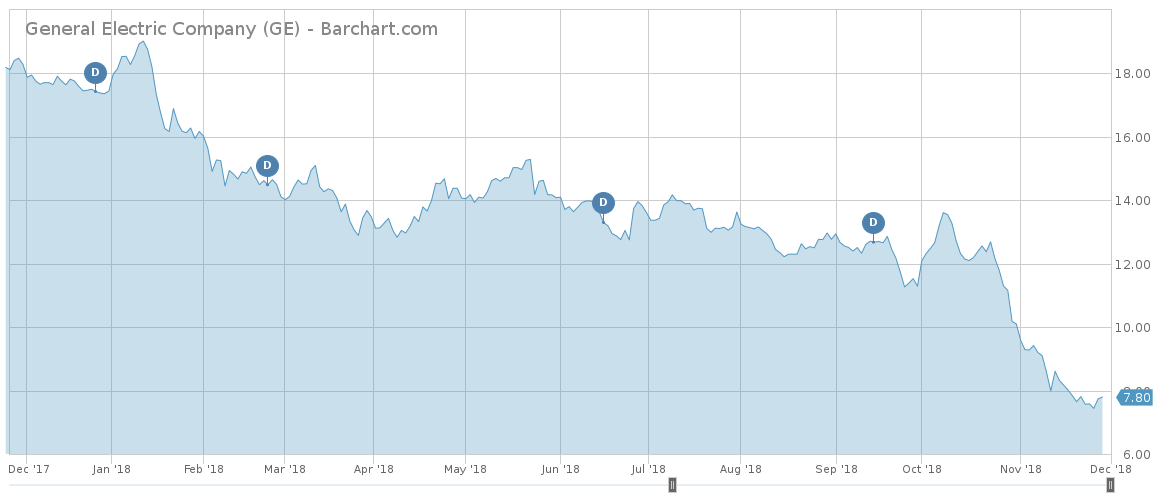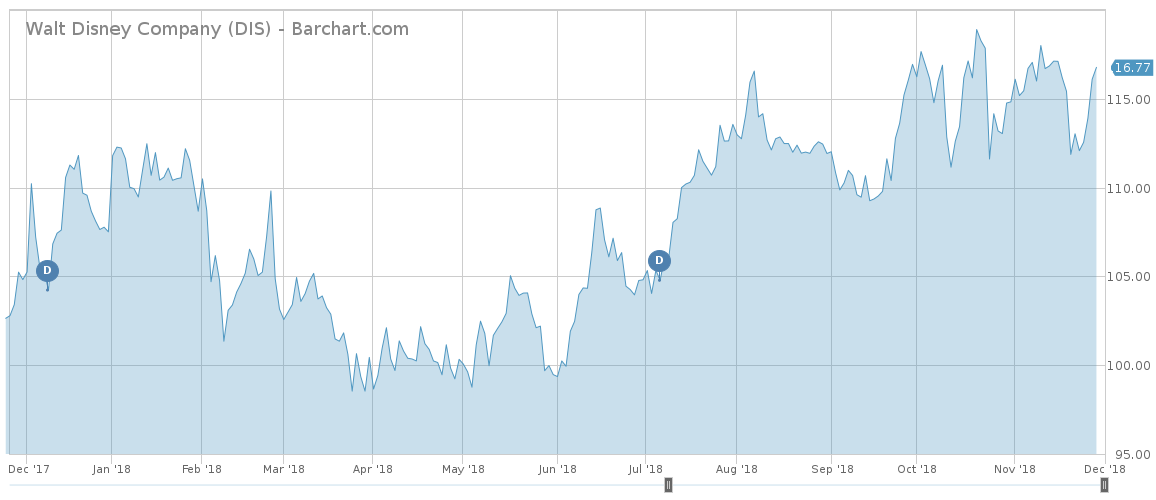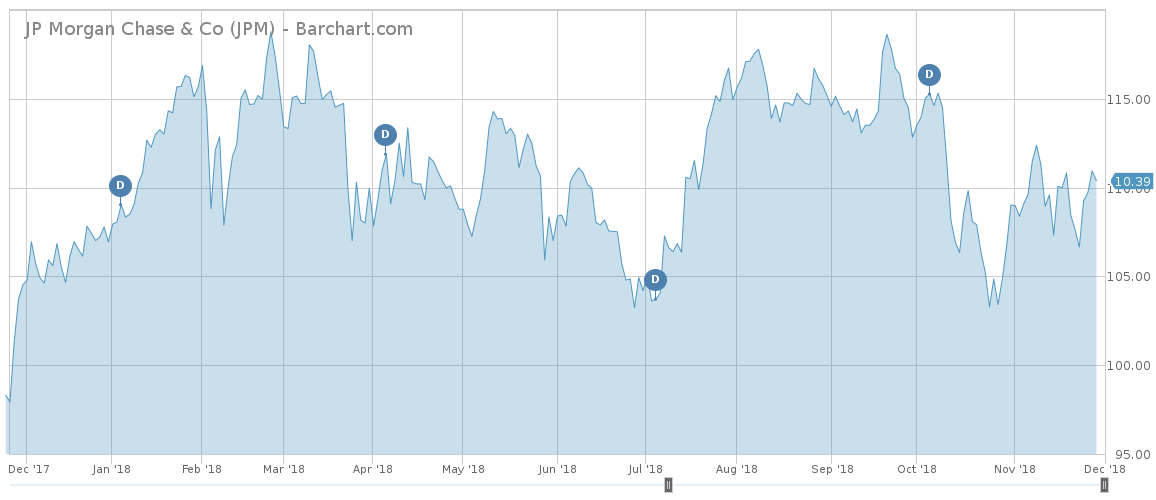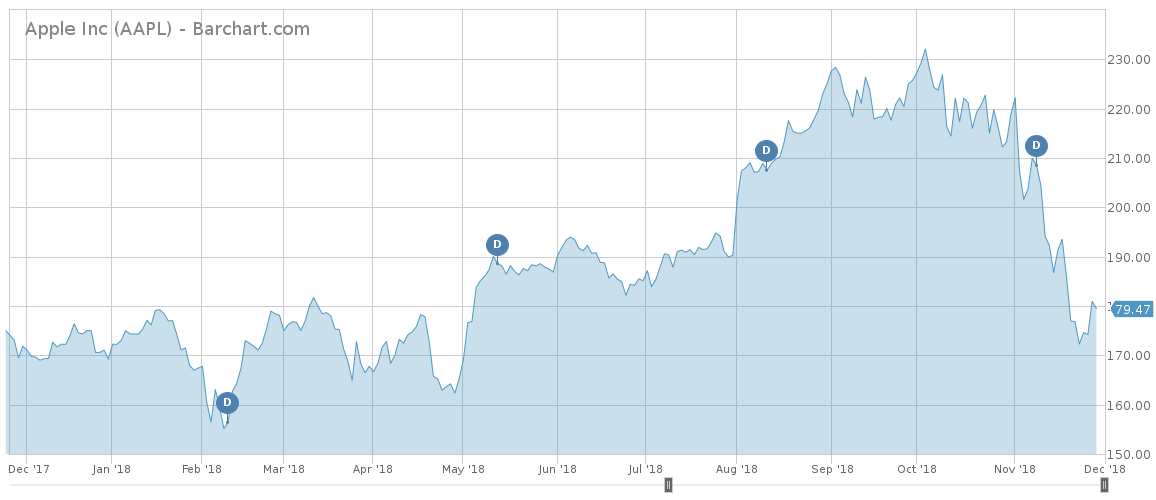This is a special edition of the Dividend.com trends, analyzing the most important events that took place over the past year.
In 2018, markets continued to rally, although, the end of the year brought concerns that the 10-year bull run may be reaching its final innings. The uptrend had been fortified by the corporate tax cuts in the U.S. and the resulting strong economy, but trade war fears combined with rising bond yields and interest rates put a lid on bulls. The gains were not evenly spread, however, with General Electric’s historic dividend cut sending tremors through the remaining conglomerates.
GE’s wobbles are one of the most important developments in the dividend world this year, followed by The Walt Disney Company. The ongoing consolidation in the global entertainment industry started by Walt Disney’s acquisition of 21st Century Fox is perhaps the biggest indication of Netflix’s competing power so far.
Amid a difficult environment for global banks, particularly in Europe, J.P.Morgan Chase has thrived and even expanded. This year also marked the first time a company reached a market valuation of one trillion dollars, namely Apple, although the iPhone-maker held that title briefly and may soon be surpassed by Amazon or its historic nemesis Microsoft.
General Electric
So much for General Electric’s (GE ) generous dividend. The legendary industrial conglomerate that traces its roots to Thomas Edison slashed its dividend this year to almost nothing in order to preserve capital as it battles with an ailing power division. Perhaps, GE’s troubles represent another cautionary tale of the risk represented by bundling together unrelated businesses. The company ventured into many industries during the tenure of legendary CEO Jack Welch, including banking, healthcare, transportation and power.
Eventually, the structure proved unwieldy and the firm is now on a quest to divest its non-core businesses and improve its focus. Divesting GE Capital, which was responsible for a good part of the profits during Welch’s tenure, has not proved easy given that lingering liabilities are still delivering losses. The final goal for the company is to create an industrial business focused on aviation, power plants and renewable energy, but the pace of change has been slow and shareholders remain impatient.
Indeed, the lack of urgency cost John Flannery the CEO seat this fall, with Lawrence Culp replacing him. Culp immediately cut the dividend to a penny-per-quarter and reported a $22 billion non-cash charge in a bid to leave behind GE’s issues as soon as possible and start with a clean slate. Whether Culp will turn around the company or share a fate similar to Flannery remains to be seen.
GE shares have lost 57% this year alone and the company now has a market capitalization of $64 billion. From its peak reached in 2000, the stock has lost around 86%.

You can use the Dividend Screener tool explore dividend-paying securities that fit your investment criteria.
Walt Disney
Perhaps 2018 will be remembered by the investment community as the year Netflix’s long-predicted disruptive force in the entertainment industry finally materialized.
Media mogul Rupert Murdoch has thrown in the towel and sold his entertainment arm, Twenty-First Century Fox, to Walt Disney (DIS ), to focus on sports broadcasting and news. The transaction was not without drama, as telecommunication conglomerate Comcast Holdings (CMCSA ) feared losing the consolidation train and mounted a fierce bidding war to acquire European cable operator Sky, which was 40% owned by Fox. Comcast eventually won the battle, but Disney got the bigger prize.
The content and content-creating capabilities acquired from Fox will give Disney a head-start in its bid to take on Netflix with its own streaming offer. Amazon is also competing in the streaming industry, but it is somewhat behind.
Netflix (NFLX) stock has risen around 40% since the start of the year, hitting a market capitalization of $117 billion. Disney advanced 6% over the same period. Next year is expected to be even more interesting, particularly as Disney launches its streaming service. Disney said its online catalog will have substantially less volume and will focus on family-friendly movies and series. Hulu, which it will own after the Fox acquisition, will stream more adult content. The streaming war is on.

J.P.Morgan
In banking, 2018 was a bit weird. While most industry giants such as J.P.Morgan (JPM ), Wells Fargo (WFC ) and Bank of America (BAC ) have consistently posted earnings beats on the back of lower taxes, higher interest rates and a solid economy, the strong performance failed to translate into rising stock prices. Indeed, Bank of America and Wells Fargo are both down 5% and 10% year-to-date, respectively. J.P.Morgan is up nearly 3%, a performance in line with the S&P 500.
Perhaps investors are still cautious about throwing money into banking stocks, fearful that another crisis similar to the last one will wipe out most of their value. In addition, a flattening yield curve, with the difference between short- and long-term yields converging, is expected to hit banks’ profitability. Banks largely make money by borrowing at short-term rates and lending for long-term periods. Moreover, the trade war between the U.S. and China, the Brexit and the slowdown in Europe stoked fears a global recession may be around the corner.
One legendary investor that went against the tide is Warren Buffett and Berkshire Hathaway. The legendary investor plowed as much as $4 billion into J.P.Morgan earlier this month, adding to his portfolio of U.S. banks, a sector he has been bullish on for decades.

FAANG
Technology stocks such as Apple and its FAANG peers were again at the forefront this year. Some of these companies’ performance have been largely responsible for the S&P 500’s tepid gains this year and in previous ones. Apple (AAPL ), the only FAANG company paying a dividend, had a relatively good year, with its profits expanding, thanks to a higher pricing point for its flagship product, the iPhone. However, by the end of the year, fears about lack of innovation and falling sales numbers have weighed on the stock.
Facebook (FB ), meanwhile, had probably the worst year among the FAANGs, largely due to a scandal in mid-2018 related to the improper use of customer data. The Cambridge Analytica debacle – the firm using data acquired from Facebook to influence the outcome of the U.S. elections – has not faded away quickly, with the social network facing increasing regulatory scrutiny. The stock is down more than 21% since January 1.
Amazon and Netflix (NFLX) had a great year. Netflix continued to acquire new customers at a fast pace, particularly in the international markets, enough for investors to disregard its high cash burn rate. The company is spending heavily on building its own content catalog, as original content creators are withdrawing materials from the platform in order to create their own streaming services.
Amazon, meanwhile, had a less dramatic year, with constant investments in innovation paying off, particularly in voice services. Its virtual assistant Alexa proved a hit with customers. Amazon and Netflix edged up 50% and 40%, respectively, since the start of the year.
Just as its stock price suggests, Alphabet (GOOG) had a largely uneventful year, with the search engine continuing to deliver handsome profits, and most of its other businesses, particularly artificial intelligence, losing money but giving hope for a much brighter distant future.

Check out our complete list of Best Dividend Stocks.
The Bottom Line
General Electric’s troubles and the resulting dividend cut is another cautionary tale about the risk of building conglomerates. Walt Disney has joined the streaming train of business with the acquisition of Rupert Murdoch’s entertainment assets. J.P.Morgan and other large U.S. banks had a great year earnings-wise, but their stocks have underperformed the broad market. FAANGs posted mixed performance, with Apple and Facebook stirring worries and Netflix and Amazon plowing ahead.
Be sure to visit our News section to catch the latest on dividend investing.





